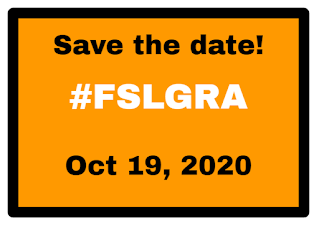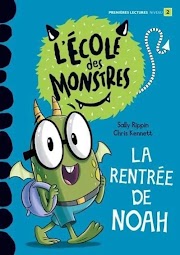Have You Signed up for the #FSLGRA Yet?
I recognize that we educators have a lot on our plates for the current school year, at the moment. Educators are adjusting to being out of the school buildings unexpectedly. Some are planning and running synchonous learning, while others are trying to figure out what off-line learning opportunities we can extend to our students - and in many cases, to our own children. But at some point, this WILL end - or at the very least, it will change. More regular programming will resume, and even if that looks different that what it was like before, routines will get reestablished.
Here's my plug for you to plan ahead a bit, amidst all this chaos. The French as a Second Language Global Read Aloud accepted nominations of great francophone books, from simple picture books to novels (ideally under 200 pages!) up to the end of March. Voting is happening RIGHT NOW.
A bit of thought now, and some collaborative open-source style planning later in this school year, over the summer, or even into the early fall can lead to a fabulous interactive and authentic experiential learning opportunity for your own students and many other classes full of FSL students next fall! For more information about the #FSLGRA, read this in English or this version en français.
My tip is to not think of the GRA as an "add on" to your existing curriculum, but to think about which aspects of the curriculum you will be addressing through the GRA, and just let that learning happen. It's ok to not do the same things your would normally do year after year. New experiences will be great both for you, and for the students. Model risk-taking and pushing oneself out of one's comfort zone with your students. If you're wondering what kind of book makes a good nomination, think about the following:
New to teaching French as a Second Language and not overly confident of your ability to recommend ideal books yet? Tha's ok. You can still sign up here, and come along for the ride, with whatever grade & programme you happen to be delivering next year. We go live for our third year on October 19, 2020.

Here's my plug for you to plan ahead a bit, amidst all this chaos. The French as a Second Language Global Read Aloud accepted nominations of great francophone books, from simple picture books to novels (ideally under 200 pages!) up to the end of March. Voting is happening RIGHT NOW.
A bit of thought now, and some collaborative open-source style planning later in this school year, over the summer, or even into the early fall can lead to a fabulous interactive and authentic experiential learning opportunity for your own students and many other classes full of FSL students next fall! For more information about the #FSLGRA, read this in English or this version en français.
My tip is to not think of the GRA as an "add on" to your existing curriculum, but to think about which aspects of the curriculum you will be addressing through the GRA, and just let that learning happen. It's ok to not do the same things your would normally do year after year. New experiences will be great both for you, and for the students. Model risk-taking and pushing oneself out of one's comfort zone with your students. If you're wondering what kind of book makes a good nomination, think about the following:
- Is the language level appropriate and accessible (with teacher support) for a French language learner, at the level you have in mind?
- Is the topic engaging for the grade levels you have in mind?
- Are there any curricular and topical connections that you and other teachers could exploit for enhanced learning (please think beyond just grammar & vocabulary, but of course those could have a role as well)?
- Is it reasonably affordable? (For example, for the primary grade levels, it often makes sense to select several picture books. Those that are priced closer to $10-15 are a better option than those in the $30 price range, since we recognize that many teachers buy these books out of their own pockets. Even when they don't school budgets tend to be stretched to begin with.)
- Is it readily available? Ideally, if it can be purchased from more than a single source, this works out best so that teachers buying just for the FSLGRA don't exhaust the supply, leaving others stranded and unable to participate)
- Is it fairly recently published? This is important both for availability - we won't select something that is out of print - and for issues of cultural appropriateness in many cases.
- Is it written in French? This isn't an absolute deal-breaker, but it's very much a desirable quality, especially for higher grades where students might be tempted to access the book in English, or have already read it in English, and thereby diminish the experience somewhat.
New to teaching French as a Second Language and not overly confident of your ability to recommend ideal books yet? Tha's ok. You can still sign up here, and come along for the ride, with whatever grade & programme you happen to be delivering next year. We go live for our third year on October 19, 2020.
 |
| Save the Date for the 2020-2021 French as a Second Language Global Read Aloud |
Voting for this third annual installment closes tomorrow! Help us to choose which books, amongst the nominated titles, we will actually use collaboratively next fall.
If you're looking for more information about what types of learning experiences you might offer to your students through this initiative, you can either explore the hashtags (explained in the introductory blog, linked above) in social media, or check out our Google Sheets for the past two years. They list many of the ideas and resources created, sourced, and shared by our teacher-participants.
Be sure to notice that there are FOUR tabs along the bottom of each file, so that you can explore the levels of the FSLGRA that are most relevant for you. And remember - many hands, lighter work! Please share whatever ideas and resources you make that are connected. These resources stay available for teachers to explore with a single partner if they wish, or even on their own with their classes as they see fit at times outside of the official FSLGRA timelines.
Be sure to notice that there are FOUR tabs along the bottom of each file, so that you can explore the levels of the FSLGRA that are most relevant for you. And remember - many hands, lighter work! Please share whatever ideas and resources you make that are connected. These resources stay available for teachers to explore with a single partner if they wish, or even on their own with their classes as they see fit at times outside of the official FSLGRA timelines.
 |
| General timelines of the #FSLGRA planning & activity cycle |
From about November to February, nominations will be accepted again for the coming year, assuming we maintain our momentum. When taht time period arriveswhenever you're ready to nominate a book, here's the link for the nominations.
(Please note: This link won't allow you to nominate while we are in the midst of voting, narrowing down the nominated books, or preparing & conducting the actual read aloud project itself. Some times our attention just needs to be directed elsewhere!)
(Please note: This link won't allow you to nominate while we are in the midst of voting, narrowing down the nominated books, or preparing & conducting the actual read aloud project itself. Some times our attention just needs to be directed elsewhere!)








